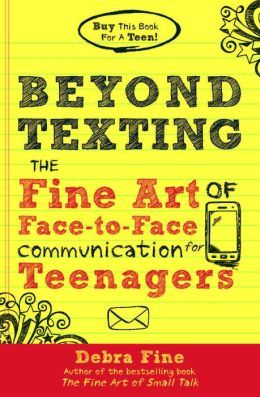Technology is a such a blessing... Until it becomes a curse. Or a crutch. Maybe it's all three, actually, when you really stop to think about it. After all, it's lovely to text a friend, letting her know you are running late for a get-together but being constantly tethered to a device and the never-ending beeping and ringing can be exhausting. Blessing vs. curse.
But it's the crutch part that resonated with me to such a level that I wrote my third book, Beyond Texting: The Fine Art of Face-to-Face Communication for Teenagers. I didn't go willingly, as they say.
The book was a result of being asked by my publishers, friends, and colleagues to please write a book for the younger generation. I didn't want to do it. I texted and emailed and FaceTimed my publisher over and over again refusing. But by then my brain had been tuned into the teenagers and 20-somethings I encountered everywhere I went, and after watching so many of them, including my own, relying on their devices to make it in the world, I relented.
Seeing teenagers constantly head down, earbuds in and hunched over their smartphones really made a mark on me. I first considered going to chiropractic school, knowing that the future generation is going to have loads of neck problems (for all of you entrepreneurs out there, may I suggest considering this line of work because surely there is money to be made) but I am no spring chicken, and small talk is my gig.
So, the book and the blogs and the talks begin now. Not to blow my own horn, but I am basically singlehandedly saving the world. I know, I know -- it's a big job. But without face-to-face communication skills, the next generation will be unable to make conversation, ask for a date, propose to a mate and, thus, create the next generation. The entire human race could die off if we don't start teaching our teens how to communicate! I don't know about you, but I'd like some grandchildren one day. And someone to serve me tapioca in the home -- when and if the time comes.
How do you teach your teen the proper way to build relationships and interact with others? While my book offers an in-depth approach, these three tips will help you both get started:
Exude Energy:
It's normal to feel nervous and overwhelmed when entering an unfamiliar situation. Take a deep breath and relax. Can't? Well, fake it if you can, and remind yourself that everybody else is feeling the same way. Put away your phone and look at others in the eye, smile and extend a firm handshake. It will feel awkward at first, and you will be itching to reach for your device as a way to curb your panic, but force yourself to engage on a human level because it gets easier. I promise. By appearing energetic, interested, engaged and friendly, people will be drawn to you, making the vibe in the room even more inviting and comfortable for you and others.
Break the Ice:
Initiating a conversation with a stranger is a gift that keeps on giving -- to both you and the your conversation partner. Even after all these years of small talk, I always enter a room with at least three topics to talk about. Always. So, here are some conversation starters that work:
•How'd you do on the test? The essay part was the toughest for me!
•Have you met the new science teacher?
•Biology is killing me -- can we study together?
•I was behind you at the assembly this morning. What did you think about the presentation?
•I love your (band) shirt. Did you know they are playing here this summer?
There is no 'perfect' conversation starter, but there is always an 'A' for effort, so saying hello first will earn you credit. Sure, you're going to get rejected sometimes and that's life. But by trying, and by being kind and genuine, you have a better shot of starting a meaningful exchange.
Introduce (and then Re-Introduce) Yourself:
This is so basic - but so often overlooked! Sometimes you've managed to actually start and carry on a great conversation and you walk away realizing that you have no idea what someone's name is and they have no idea what yours is! Give someone the gift of your name, even if you think they may know you already:
John (to a professor): I was so happy with the B on the final
Professor: Yes, good work.
John:I'm John Smith - I am in your Tuesday/Thursday class and am registering for your course next semester.
Professor: Great, John. I'll look forward to seeing you in class.
John: Thanks Professor Green; have a good summer.
John re-introduced himself to his professor and established a connection. Next semester, if John needs some additional help or is looking for a reference, he's already set himself apart from the other hundreds of students Professor Green sees every week. One small exchange can result in big things.
When I look back on my teen years, I shudder at the memories. My hands shook during presentations. My mouth went dry when a boy talked to me. My heart pounded when I walked into a party alone. The tips I shared here -- and the others in my book -- are not earth-shattering but oh so necessary. Social media may be killing all of of our social skills. But by teaching our teens the basics, and helping them embrace face-to-face communication, we are saving the world! And we have a greater chance of having successful, self-supporting adult children! And grandchildren! And tapioca!

